It’s been an unusual year, so this year more than ever it’s essential you undertake some personal tax planning. Tax planning 2020 will ensure that you maximise the personal deductions you are eligible for, reduce the amount of tax you have to legally pay while reducing the risk of audit by the ATO.
This 2020 end of financial year update outlines the actions to take to do exactly that.
Working from home tax deductions
From 1 March 2020 until at least 30 June 2020, special arrangements are in place to make it easier for individuals to claim expenses they have incurred while working from home during the COVID-19 pandemic.
If you have incurred work-related expenses and you have not been reimbursed by your employer, you can claim these expenses at a rate of 80 cents for each hour you work. To use this method, you will need a record of the hours you have worked, such as a diary or timesheet.
The claim covers all of your additional running expenses such as:
- Electricity and gas
- Decline in value and repair of capital items such as office furniture
- Cleaning expenses
- Phone and internet expenses
- Stationery
- Decline in value of computers and devices
For example, if you worked from home for 7 hours a day on the weekdays between 1 March and 30 June 2020, that’s 84 working days (in QLD and NSW) or 588 hours. Using the 80 cents COVID-hourly rate, you could claim $470.40. The rate covers all of your expenses and you cannot claim individual items separately, such as office furniture or a computer.
The COVID-hourly rate can be claimed per individual (it is not limited by household). That is, if you have multiple people working from home in your household, each person can claim the 80 cents per hour rate for the hours they have worked from home.
Using the COVID-hourly rate is optional and aimed at people who do not normally work from home. For some, their expenses will be higher, such as those with a dedicated home office, or for those that normally operate their business from home. In these circumstances the normal rules will apply.
The ATO appears to be taking the view that occupancy costs such as mortgage interest payments and rent cannot generally be claimed by those who are temporarily working from home as a result of COVID-19.
Learn more about working from home tax deductions for 2020 including what records you need to keep on our earlier article: Working from home tax deductions 2020
Tax deductions for home based businesses
In general, if your business is a home-based business, you should be able to claim both occupancy and running expenses. However, if you operate through a company or trust, the ATO’s preference is that there should be a rental agreement in place between the entity and the property owner.
If there is a genuine rental contract, then the property owner should recognise the rental income and should then seek to claim a reasonable portion of their expenses against the rental income. The business entity should generally be able to claim a deduction for the rent that is being paid to the owner of the property.
Without a genuine rental contract, it is difficult for the business to claim a deduction for any of the expenses relating to the portion of the property that it uses in the business.
Work-related car expenses
The rate at which work-related car expenses can be claimed using the cents per kilometre method will increase from 1 July 2020 from 68 cents to 72 cents per kilometre.
Using this method a maximum of 5,000 business kilometres can be claimed per year per car which works out to be a $3,400 tax deduction if you can show that you traveled at 5,000 kilometres during the 2020 financial year.
If leasing a vehicle check to see whether you can pre-pay lease payments as part of your tax planning 2020.
The ATO has a great website section on Car Expenses here which covers the following:
- When you can and can’t claim car expenses
- Calculating your deductions
- Owned or leased cars
- Damage to a third-party motor vehicle
ATO target area: Foreign income
The ATO has flagged foreign income as an area of interest. Because your tax residency can be different to your general residency status, it’s important to seek clarification if you are uncertain.
For tax purposes:
Australian resident
Taxed on worldwide income including money earned overseas (such as employment income, directors’ fees, consulting fees, income from investments, rental income, and gains from the sale of assets).
Foreign resident
Taxed on Australian sourced income and some capital gains. Unlike Australian resident taxpayers, non-resident taxpayers pay tax on every dollar of taxable income earned in Australia starting at 32.5% although lower rates can apply to some investment income like interest and dividends.
There is no tax-free threshold. Australian sourced income might include Australian rental income and income for work performed in Australia.
Temporary resident
Generally, those who have come to work in Australia on a temporary visa and whose spouse is not a permanent resident or citizen of Australia. Temporary residents are taxed on Australian sourced income but most forms of foreign sourced income are not taxed in Australia.
In addition, gains from non-Australian property are excluded from capital gains tax.
One of our most popular articles from a few years ago is: Australian resident for tax purposes, explained. Understanding your Australian tax residency status may be important for your tax planning 2020.
Just because you work outside of Australia for a period of time does not mean you are not a resident for tax purposes during that period. And, for those with international investments, it’s important to understand the tax status of earnings from those assets. Just because the asset might be located overseas does not mean they are excluded from Australian tax law, even if the cash stays outside Australia.
Don’t assume that just because your foreign income has already been taxed overseas or qualifies for an exemption overseas that it is not taxable in Australia.
30 June 2020 deadline for foreign residential property owners
Legislative changes made earlier this year prevent foreign residents from accessing a capital gains tax (CGT) exemption on their Australian family home (the main residence exemption).
A transitional rule enables foreign residents who have held their property continuously from 9 May 2017 to access the exemption if they sell by 30 June 2020 (or sign a sale contract).
After 30 June 2020, if you are a non-resident for tax purposes at the time you sell your main residence, you will no longer be able to access the main residence exemption and you will need to pay CGT on any gain you make. These new rules apply regardless of whether you were an Australian resident for part of the time you owned the property and no apportionment applies – the exemption simply does or does not apply depending on your residency status for tax purposes at the time the CGT event is triggered. The CGT event is generally triggered when the contract of sale is signed.
However, if you are a resident of Australia at the time of the CGT event, then you may be able to access the main residence exemption, even if you have been a non-resident for some or most of the ownership period. For example, an expat who maintains their main residence in Australia could return to Australia, become a resident for tax purposes again, then sell the property and if applicable, access the main residence exemption (the rules contain provisions that will deny the exemption where someone attempts to avoid the new rules by deliberately structuring their affairs to access the exemption – for example, transferring the property to a related party).
An exclusion also applies where the individual has been a foreign resident for six years or less and a ‘life event’ occurs such as death or a terminal illness.
Commercial and residential rental properties: COVID-19
Rental properties are always high on the ATO’s agenda and this year will be no different.
If COVID-19 has impacted commercial or residential premises you own and rent out, from a tax perspective there is very little that has changed.
- If tenants remain in the property or the property remains genuinely available for rent, you can continue to claim expenses as usual, even if the rental rate has been reduced on a temporary basis or tenants have been unable to pay rent for a period of time.
- If you negotiated with your bank to defer mortgage repayments, you can continue to claim interest as the deferred interest is capitalised.
- If you received an insurance payment for rent defaults, or your tenant made a back payment of rent they owe, this income is taxable and will need to be declared in your tax return.
Rental property tax deductions 2020
Outside of COVID-19 related issues, the ATO continues to find errors in rental property claims made with up to 90% of tax returns containing an error, particularly for ‘other’ deductions and interest.
Common issues to consider as part of your tax planning 2020 include:
- Claiming deductions for properties that are not genuinely available for rent
- Claiming deductions for an entire property when only part of the property was available for rent
- Claiming deductions for loan interest expenses when a portion of the loan was used for private purposes
- Incorrect categorisation of expenditure incurred in order to repair or improve the property
- Not having records to substantiate income received and deductions claimed. If you are claiming a rental property expense it is important to substantiate the claim. In the event of an ATO audit, if you cannot produce a tax invoice or other evidence for an expense, it is likely the deduction will be denied.
- Incorrectly apportioned claims for interest deductions
If your rental property is outside of Australia, and you are an Australian resident for tax purposes, you must recognise the rental income you received in your tax return (excluding any tax you have paid overseas), unless you are classified as a temporary resident for tax purposes. You can claim expenses related to the property, although there are some special rules that need to be considered when it comes to interest deductions. For example, if you have borrowed money from an overseas lender you might be subject to withholding tax obligations.
Deductions no longer available for vacant land
From 1 July 2019, new rules prevent some taxpayers from claiming a deduction for interest and other holding costs for property that they own. Previously, if you bought vacant land with the intent to build a rental property on it, you may have been able to claim tax deductions for expenses incurred in holding the land such as loan interest, council rates and other ongoing holding costs.
Mum & Dad developers are the focus of these changes. Since the new laws apply retrospectively to losses or outgoings incurred on or after 1 July 2019 regardless of whether the land was first held prior to this date, and with no grandfathering in place, the amendments not only impact those intending to develop vacant land but those who have acquired land to develop.
The rules seek to ensure that deductions cannot be claimed during periods where a residential dwelling is being constructed or substantially renovated until the work has been completed, an occupancy certificate is issued and the property is either rented out or genuinely available for rent.
Where holding costs cannot be claimed as a deduction, then they will generally be added to the cost base of the property for CGT purposes. This means that they can potentially reduce a capital gain made when you dispose of the property in the future. However, holding costs cannot be added to the cost base of a property unless it was acquired after 20 August 1991 and these costs cannot increase or create a capital loss on sale of a property.
Superannuation: Carry forward unused concessional contributions
Superannuation contributions should be an essential part of your tax planning 2020, especially now with the ability to make catch-up contributions as well as being able claim a personal tax deduction in addition to contributions made by your employer up to your annual $25,000 cap.
If you have unused concessional contributions, that is, you did not contribute the full $25,000 in 2018-19 or 2019-20, then you can carry forward these amounts for five years on a rolling basis if your total superannuation balance is below $500,000 on 30 June (of the year you intend to access the unused amount).
The ability to carry forward concessional contributions applies from 1 July 2018, with 2019-20 financial year being the first year an individual can access their unused carry forward concessional amount.
Concessional contributions include employer contributions (super guarantee and salary sacrifice) and personal contributions where you have claimed a tax deduction.
For example, if your total concessional contributions in the 2019-20 financial year were $10,000 and you meet the eligibility criteria, then you can carry forward the unused $15,000. You may then be able to make a higher deductible personal contribution in a later financial year. If you are selling an asset and likely to make a taxable capital gain, a higher deductible personal contribution may assist in reducing your tax liability in the year of sale.
Remember:
- Your total superannuation balance must be below $500,000 on 30 June of the prior year before you utilise any carried forward amount (within the 5 year term); and
- In some cases, an additional 15% tax can apply (30% total) to concessional contributions made to super where income and concessional contributions exceeds certain thresholds ($250,000 in 2019-20). Your income could be higher than usual in the year when you sell an asset for a capital gain.
This is an excellent concession to help you top up your superannuation, especially where you are out of the workforce at some stage.
Making your tax planning 2020 and tax return preparation easy
Once you’ve completed for tax planning 2020, you need to ensure your records are in order.
Preparing your end of year documents and information prior to coming to see us will save you time and money. This is a general list of what to have ready to enable us to most efficiently complete your returns.
- Income Statement
- Interest income from banks and building societies
- Dividend statements for dividends received
- Tax statements of managed investment funds
- Rental property statements from real estate agent and details of other expenditure incurred
- For share sales or purchases, the purchase and sale contract notes
- For real estate sales or purchases, the solicitor’s correspondence for the purchase and sale
- Any expenses related to your work you have not claimed from your employer
- Self-education expenses
- Travel expenses
- Donations to charities
- Payments for income protection or sickness and accident insurance
- Health insurance and rebate entitlement
- Family Tax Benefits received
- Commonwealth assistance notices
- Medical Expenses (if they relate to disability aids, attendant care or aged care services)
- IAS statements or details of PAYG Instalments paid
- Details of any transactions involving cryptocurrency (e.g., Bitcoin)
- Details of any income derived from participating in the sharing economy (e.g., Uber driving, rent from AirBNB, jobs completed through Airtasker etc.,)
Tax Planning 2020: Companies, Trusts and More
If you have a company, trust and SMSF, or are running a business, the following tax planning 2020 articles may assist:













